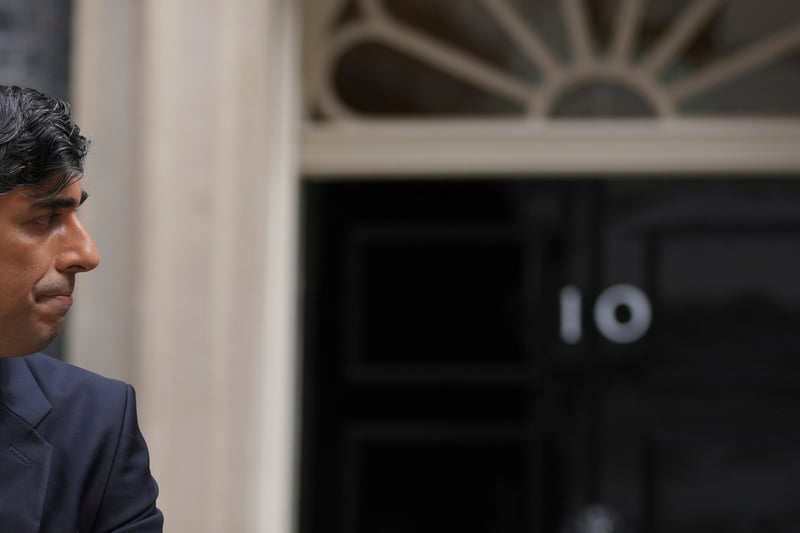(CN) — After 14 years in the opposition, the United Kingdom’s Labour Party will now run the country’s government following a decisive general election result on Thursday that swept the Conservative Party from power.
“Our country has voted decisively for change, national renewal and a return to the politics of public service,” new Prime Minster Keir Starmer said in remarks in front of 10 Downing Street, the British prime minister’s official residence. He promised to bring stability and moderation to government and oversee “a calm and patient rebuilding” of the nation.
Labour secured almost two-thirds of the 650 seats in Parliament, ensuring one of the largest parliamentary majorities in British political history. That win, though, comes in an election that saw turnout significantly down from previous polls.
Starmer faces a number of immediate challenges as he enters office, including a health and social care system in crisis and a overcrowded prison system on the verge of collapse.
Water companies, universities, and local authorities around the country are on the brink of bankruptcy, while ongoing public sector strikes are disrupting the delivery of frontline services. Starmer, meanwhile, also suffers from a lack of enthusiasm. When pollsters assembled a word cloud to capture how British voters felt about him, the biggest word that came to mind was “boring.”
Starmer’s new chancellor of the exchequer, Rachel Reeves, will become the first woman to run the British economic ministry. But her fiscal rules are strict, leaving little room for revenue-raising to tackle the country’s long-standing problem of chronic underinvestment.
Starmer’s promises to voters have so far been opaque. His political strategy has been to say as little as possible while the Conservatives fell apart in office.
This approach reduced his opponents’ ability to attack him and helped deliver the thumping Labour majority. Now that he’s won, the onus is on him to start offering solutions — a task that could prove challenging given a skeptical British electorate.
After receiving the worst election result in almost 200 years of Conservative Party history, outgoing Conservative Prime Minister Rishi Sunak apologized to the nation.
“The British people have delivered a sobering verdict tonight,” Sunak said before tendering his resignation to King Charles III. “I have heard your anger, your disappointment, and I take responsibility for this loss.”

Labour’s large majority is a dramatic reversal from the outcome of the previous general election in 2019, when then-Prime Minster Boris Johnson delivered the largest Conservative majority since 1987.
Labour’s impressive gains, though, belie a more complicated picture on the ground.
Despite the clear victory, Labour actually lost votes relative to its previous two general election campaigns. Across the country, the party also suffered a series of unexpected losses in supposedly safe seats.
Four Labour MPs — including the party’s paymaster general Jonathan Ashworth — lost their seats to pro-Palestinian independent candidates, highlighting the loss of Labour support among Muslims angry about Starmer’s strong pro-Israel position. Other key Labour figures, including Health Secretary Wes Streeting, only narrowly held their seats in the face of strong challenges from Palestinian independents.
In London’s Islington neighborhood, former Labour leader Jeremy Corbyn — now unaffiliated — successfully defeated his old party. Starmer had removed him from the party as part of an effort to distance himself from Corbyn’s left-wing politics.
The victory makes Corbyn the longest serving MP in Parliament — a position known as “Father of the House.”
“I owe my life, my learning and my abilities entirely to the people of Islington,” a visibly emotional Corbyn said after winning reelection. “This victory is a dedication to them.”
These Labour losses despite a large national swing towards the party highlight the danger of complacency for the new technocratic prime minister, who ascends to office without much public enthusiasm behind him.
The main story of this election is not one of Labour gains but rather the catastrophic collapse of the Conservative vote. With just 121 MPs, the party has been reduced to its smallest size ever after a whopping 251 election losses.
Eight former Conservative cabinet members lost their seats over the course of the night, including Education Secretary Gillian Keegan and Defence Secretary Grant Shapps.
“Its not so much that Labour won this election, but rather that the Conservatives have lost it,” Shapps said in a concession speech.

In South West Norfolk, former Prime Minister Liz Truss managed to lose what had been one of the safest seats in the country. Among other senior Conservatives who lost seats were grassroots favorite Jacob Rees-Mogg and future leadership hopeful Penny Mourdant, who looked visibly shocked by the result.
It is not just Labour that benefited from the collapse in the Conservative vote. The centrist Liberal Democrats party won 71 seats, mostly in southern England, representing their best-ever result in a general election.
For the first time, right-wing firebrand Nigel Farage, leader of the nativist Reform Party, also secured election to Parliament after seven failed attempts to do so. In a victory speech, Farage he said he would rather “let the Conservative Party tear themselves apart” than join a pact with them and that his party would now “focus on going after the Labour vote.”
Also for the first time, the Green Party won two safe Conservative seats in rural England, bringing their total number of MPs to four. The win represents a major success for the small party and is a vindication of its election strategy to focus on just four seats.
Another big loser of the night was the Scottish National Party, which not only lost 39 seats but also its status as the U.K. Parliament’s third-biggest party. The SNP have suffered a turbulent 18 months of leadership crises, leading to steep drop in popularity in its home turf of Scotland.